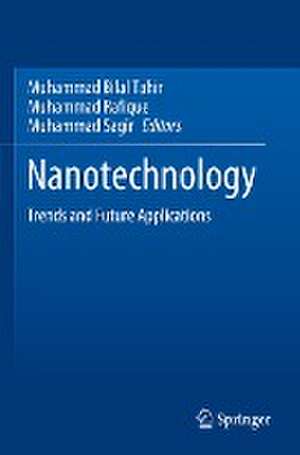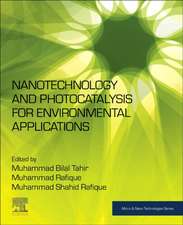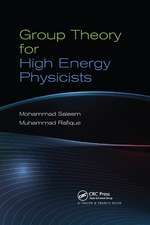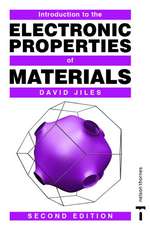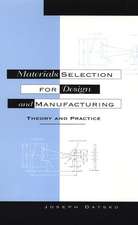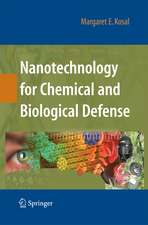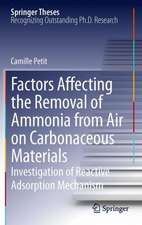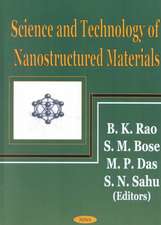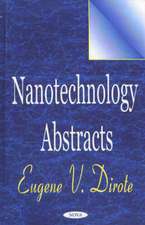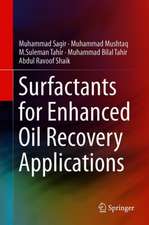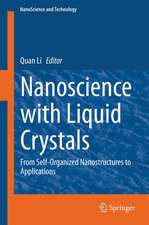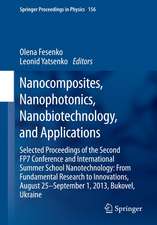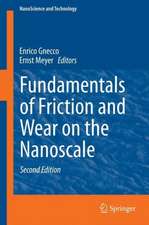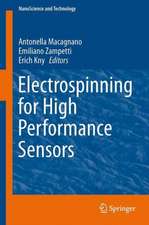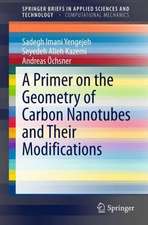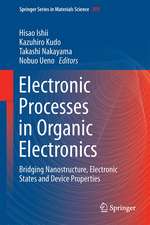Nanotechnology: Trends and Future Applications
Editat de Muhammad Bilal Tahir, Muhammad Rafique, Muhammad Sagiren Limba Engleză Paperback – 26 mai 2022
| Toate formatele și edițiile | Preț | Express |
|---|---|---|
| Paperback (1) | 576.74 lei 6-8 săpt. | |
| Springer Nature Singapore – 26 mai 2022 | 576.74 lei 6-8 săpt. | |
| Hardback (1) | 780.19 lei 6-8 săpt. | |
| Springer Nature Singapore – 25 mai 2021 | 780.19 lei 6-8 săpt. |
Preț: 576.74 lei
Preț vechi: 678.52 lei
-15% Nou
Puncte Express: 865
Preț estimativ în valută:
110.36€ • 115.53$ • 91.31£
110.36€ • 115.53$ • 91.31£
Carte tipărită la comandă
Livrare economică 05-19 aprilie
Preluare comenzi: 021 569.72.76
Specificații
ISBN-13: 9789811594397
ISBN-10: 9811594392
Pagini: 142
Ilustrații: V, 142 p. 48 illus., 28 illus. in color.
Dimensiuni: 155 x 235 mm
Greutate: 0.22 kg
Ediția:1st ed. 2021
Editura: Springer Nature Singapore
Colecția Springer
Locul publicării:Singapore, Singapore
ISBN-10: 9811594392
Pagini: 142
Ilustrații: V, 142 p. 48 illus., 28 illus. in color.
Dimensiuni: 155 x 235 mm
Greutate: 0.22 kg
Ediția:1st ed. 2021
Editura: Springer Nature Singapore
Colecția Springer
Locul publicării:Singapore, Singapore
Cuprins
Chapter 1. Historical Background, Development and Preparation of Nanomaterials.- Chapter 2. Types and Classifications of Nanomaterials.- Chapter 3. An Insight into the chemistry of nanostructures and their defects.- Chapter 4. Nanostructures: A Solution to quantum computation and energy problems.- Chapter 5. Production of Bioplastics by Different Methods-A Step towards Green Economy.- Chapter 6. Challenges and Future Prospects.
Notă biografică
Dr. Muhammad Bilal Tahir is a Researcher at the University of Gujrat, Gujrat, and currently working on nanotechnology for material processing, photocatalysis, energy and environmental applications, colloids & surfactants. His initial work was on photocatalysis-based processes for decontamination of pollutants, adsorption of heavy metals in water and oil, and energy production.
Muhammad Rafique received his Ph.D. from the University of Engineering and Technology, Lahore, Pakistan. Currently, he is working as an Assistant Professor in the Department of Physics, University of Sahiwal, Sahiwal. His research interests include energy storage and conversion devices, supercapacitors, fuel cells, hybrid energy storage materials, nano-composite as energy storage and photocatalytic materials, laser–matter interactions, photocatalysis, water splitting and water purification, dye degradation, industrial wastewater treatment, antibacterial activities, anti-cancer nanomaterials, heterojunction solar cells, etc.
Dr. Muhammad Sagir has over 10 years of research experience in the field of oil and gas, enhanced oil recovery, surfactants, and photocatalysis. He is currently working as an Assistant Professor at the Department of Chemical Engineering, University of Gujrat, and is involved in 4 different research projects as PI, Co-PI, and collaborator. He has also been part of a number of research projects completed in various capacities.
Muhammad Rafique received his Ph.D. from the University of Engineering and Technology, Lahore, Pakistan. Currently, he is working as an Assistant Professor in the Department of Physics, University of Sahiwal, Sahiwal. His research interests include energy storage and conversion devices, supercapacitors, fuel cells, hybrid energy storage materials, nano-composite as energy storage and photocatalytic materials, laser–matter interactions, photocatalysis, water splitting and water purification, dye degradation, industrial wastewater treatment, antibacterial activities, anti-cancer nanomaterials, heterojunction solar cells, etc.
Dr. Muhammad Sagir has over 10 years of research experience in the field of oil and gas, enhanced oil recovery, surfactants, and photocatalysis. He is currently working as an Assistant Professor at the Department of Chemical Engineering, University of Gujrat, and is involved in 4 different research projects as PI, Co-PI, and collaborator. He has also been part of a number of research projects completed in various capacities.
Textul de pe ultima copertă
This book presents the basic and fundamental aspects of nanomaterials, its types, and classifications with respect to different factors. It contains methods of preparation and characterization of unique nanostructured materials. Consisting of six chapters, this book appeals to a wide readership from academia and industry professionals and is also useful to undergraduate and graduate students focusing on nanotechnology and nanomaterials, sustainable chemistry, energy conversion and storage, environmental protection, opto-electronics, sensors, and surface and interface science. It also appeals to readers who wish to know about the design of new types of materials with controlled nanostructures.
Caracteristici
Highlights the basic and fundamental aspects of nanomaterials, its types, and classifications with respect to different factors Discusses the preparation and characterization of unique nanostructured materials Contains contributions from industry professionals and researchers presenting the latest in the area of nanoscience
